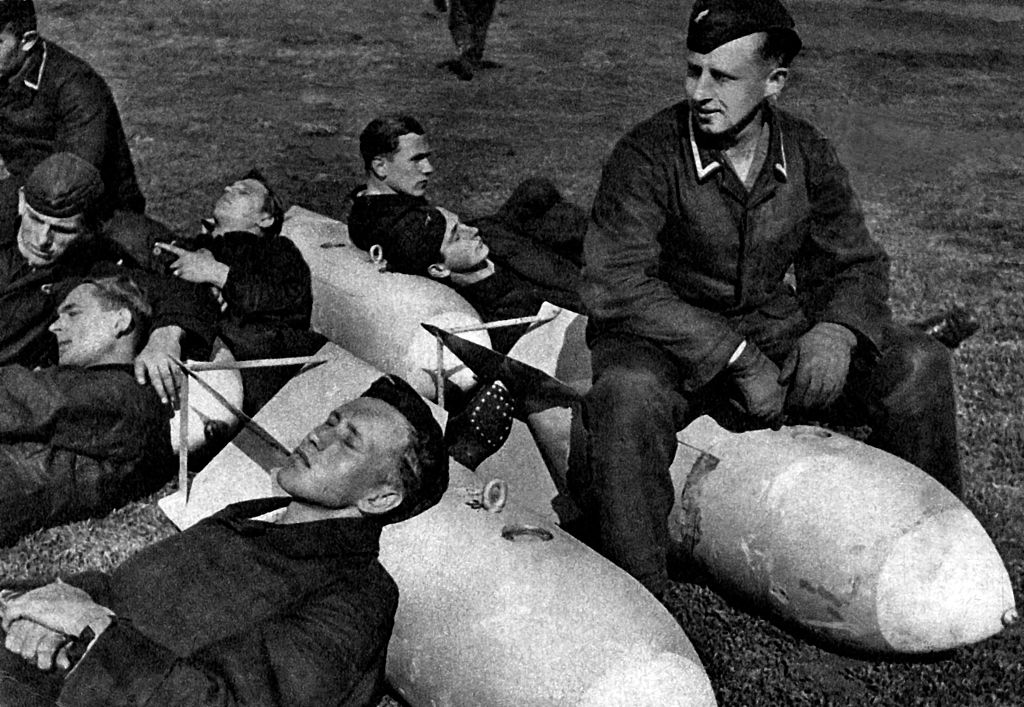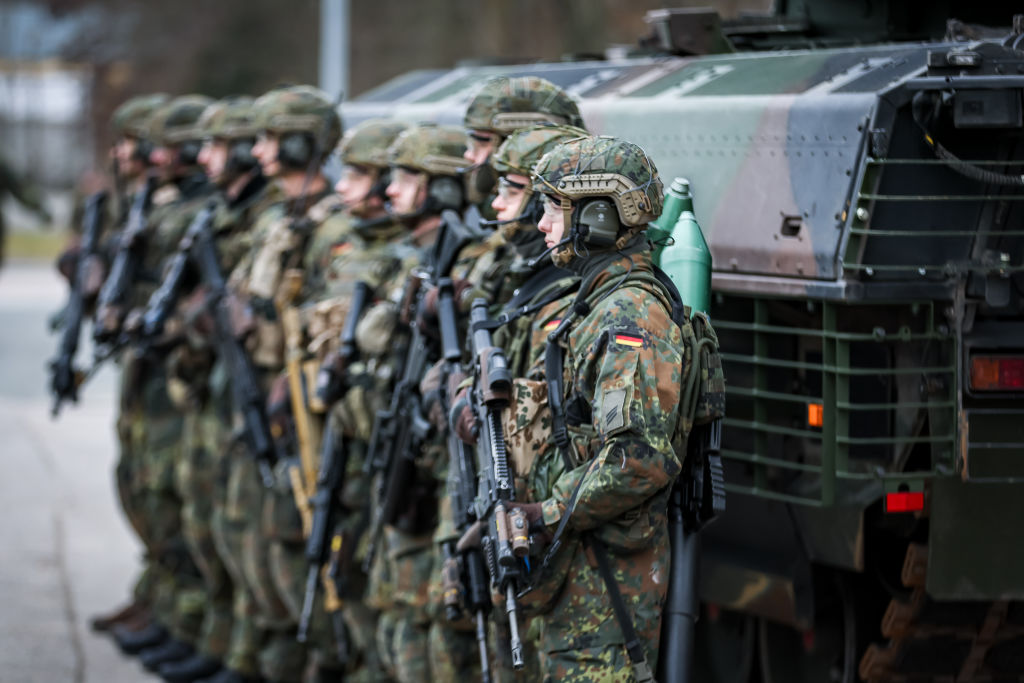Robert Deegan is dead. A million Ukrainian men have fled their native country to avoid the war, many to Ireland where they have been lavished with free accommodation and tax-free government grants, while a gallant handful of Irish volunteers have gone in the opposite direction. One of these was Robert Deegan, a former Special Forces soldier in the Irish Army’s Ranger Wing, who while serving in the Ukrainian Army last year survived a roadside blast that blinded him in one eye. He nonetheless returned to what he perceived was his duty and he was killed earlier this month while on active service fighting the Russian invaders.
It is no contradiction to honour such a brave young Irishman who gave his life for freedom while wishing this dreadful war might come to a speedy end.
No such option was available in Europe eighty years ago, with Normandy being liberated only after two dreadful months of fighting. It would be stupid here to compare Putin with Hitler. The former is a homicidal tyrant, but there are limits to his appetite for murder, whereas the latter was a genocidal monster who had created one of the most efficient military regimes in world history. Arguments about the rightness of the murder of tyrants is made imponderable about the “when” of it: an early assassination before a casual murderer mutates into a mass-murderer could have triggered a wave of retaliatory terror that at the time would have made the assassination utterly unjustified. A later assassination – of, say, Hitler whose atrocities had by then made any hypothetical but earlier terror seem relatively trivial – might merely remove am incompetent leader (which Hitler had become) and thus allow a more efficient but more devious monster, such as Speer or Doenitz, take charge.
So, it comes down to war-fighting that is invariably done by ordinary men, as recent events in Gaza, Lebanon and Ukraine have revealed, a sentence that would not merely have been absurd at the start of this century but quite unwritable. After decades of idiotic reality-denial, we are again reminded of what the soldiers of eighty years ago already knew in their bones. War is largely men’s business. Of course, feminists still demand 50 per cent of everything, apart, that is, from 50 per cent of corpses, 50 per cent of limblessness, 50 per cent of blindness and 50 per cent of lifelong trauma.
The soldiers of North America and the United Kingdom emerged from Normandy with these figures: USA men dead, 29,000, British men dead, 17,000, Canadian men 5,300 men. Included here was 16-year-old Private Jack Banks, Durham Light Infantry, the youngest British soldier to die in Normandy, who is buried in Jerusalem Cemetery in Chouin, near the graves of two army chaplains. The Roman Catholic Father Gerard Nesbitt, of an Irish family in Durham, was killed ministering to the wounded by an air-burst shell in July 1944. Two days later, as the Church of England’s Reverend Cecil Hawksworth was conducting Nesbitt’s funeral, he was killed by another air-burst shell. The two priests are now buried beside one another, no doubt as much out of corporeal as vocational propinquity.
In the melancholy aftermath of such astonishing slaughter, the posthumous perpetuity of enemies sometimes became a norm, with many graves of soldiers of the Third Reich inhabiting their own half acre of Commonwealth War Graves cemeteries, some corner of a British field that is forever Germany. The Wehrmacht’s Johan Thum, Engelberth Kentenich and Helmut Glaswol were all seventeen when they were killed in Normandy, but not so Heiko Amelsburg. He had ceased to be seventeen on the very day that he was killed, making 18th birthday also his deathday, his agelessly teenage bones now lying forever in the Commonwealth military cemetery at Ryes.
However, merely to sentimentalise these tragedies can only confuse outcome with both cause and causality. The cause was Hitler, the Nazis, and the military genius of the German people: the causality must also include those forces which, by their stupidity or laziness or cowardice or moral abjectness, allowed the first three to erupt out of the bonds that had understandably been created by the Treaty of Versailles. The same stricture today applies to the EU and USA for not creating military disincentives for Russia once it had become clear that Putin was a dangerous and egotistical madman whose appetite for murder could only be curbed by the certainty of military consequence.
The Putinesque scenario propounded by the likes of Tucker Carlson that Russia was compelled to invade Ukraine because of the encroachment by NATO into neighbouring states is simply ridiculous. Its underlying premise is that NATO was and remains intrinsically a threat to common civility – whereas it has been Russia’s aggression towards half a dozen of its neighbours that has made NATO so popular with east European states that have absolutely no connection with the Atlantic.
Russia had been a co-guarantor (along with the USA) of the independence of Ukraine when the latter unilaterally abandoned nuclear weapons. The American President who later querulously stood by while Russia launched its unprovoked attack on Ukraine was of course Barack Obama, whose sublime fluency with an autocue was equalled by the comparable fluidity of his spine whenever faced with a major strategic challenge.
However, it would be wrong to blame Obama alone when the EU, and Merkel’s Germany especially, were treating Russia as a most-favoured state, even while its conduct towards its lesser neighbours was becoming increasingly criminal. I may have a fantasy that somewhere in the joint KGB-SVR files might linger a coded record of what the young Angela Merkel had been programmed to do if the Soviet Union and its empire ever fell apart. If it was to do what she subsequently did, then my imagination makes it was one of the most brilliant agent-infiltrations of all time, for her energy-Ostpolitic created a German dependency on Russian gas that nearly made Berlin a client of the Kremlin.
Certainly, by the time that Putin resumed his attack on Ukraine thirty months ago, it appeared that Germany had become ineradicably reliant on Russian gas. As luck (plus Trump and a few independent spirits in the EU) would have it, by that time, US oil-fracking and natural gas supplies had coincidentally created fresh energy sources for the EU and Germany. It was the nearest-run thing you ever saw in your life, as Wellington rightly observed after Waterloo.
But by a wide margin, of all the EU countries that have chosen not to defend themselves and to rely on the USA (and the UK) to do what they will not, it was Wellington’s homeland of Ireland whose conduct has been the most frivolous and contemptible. Though its IT economy is wholly dependent on the transatlantic cables off its south-western coast, it is quite incapable of even pretending to protect them, making little serious attempt even to guard its own fisheries. Its naval service is so run down and demoralised that it has even introduced incentives for its seamen to remain in service well into old age, and their ability to board a hostile vessel probably depends on the latter’s willingness to haul Irish Naval Service wheelchairs onto its quarter-deck.
Whatever the many failures of the Irish state, there has never been a lack of individual Irishmen to put their lives on the line for the freedom of others, as with the dauntless Robert Deegan. Eighty years ago, Irishmen were to the fore in the fight for world freedom, and fully 10 per cent of the men of the glider-borne Ox & Bucks Light Infantry that seized Pegasus Bridge over the Orne canal in the opening minutes of the D-Day invasion of 1944 were Irish – “the best 10 per cent, in my opinion,” said Colonel John Howard, the operation’s commanding officer. In the D-Day film, “The Longest Day,” Howard was played by Richard Todd, another Irishman who in real life had – and quite bizarrely – been a paratrooper who later that morning had reinforced the original Ox and Bucks glider-party.
Shortly after that brilliant coup at Pegasus Bridge, at around 3 am on June 6, 1944, Edward Delaney O’Sullivan was one of few from the extraordinarily brave 22nd Independent Parachute Company who were dropped deep into German-held territory to set marker-flares for the waves of paratroopers to follow. He landed in St Pierre’s cemetery in the village of Touffreville outside Caen, where he became caught up in a firefight with a German sentry in which both men perished. He was the first of 153 soldiers from “neutral Ireland” killed in the vicious war to free Normandy (never mind the Irish seamen or airmen who died there, or the thousands who fell elsewhere). When after the war his headstone was erected above his grave in that very churchyard where he had been shot, his family caused these words to be carved on it: I will ask my God to let me make my heaven in that dear land across the Irish Sea.
Dear land indeed: but often made so by the best it breeds who have run from it rather than the lesser breeds who run it.
Kevin Myers is an Irish journalist, author and broadcaster. He has reported on the wars in Northern Ireland, where he worked throughout the 1970s, Beirut and Bosnia.





Big apes, but not small humans, come under protection of Spanish law